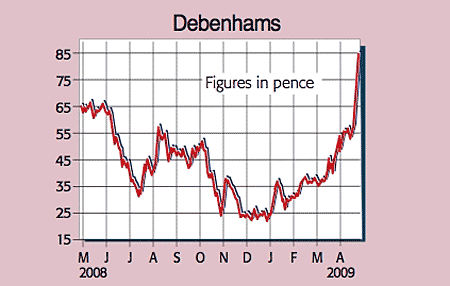
With the UK economy shrinking at its fastest pace in 30 years, it’s no surprise there’s blood on the high streets. But what about department store chain Debenhams? Last Thursday, the group reported better-than-expected interims. Most of the uplift was driven by 11% growth in its “Designers at Debenhams” range, where a leopard print dress by Julien Macdonald became its all-time bestseller. The CEO said it “could be seen at the Oscars, with people wearing that sort of style for £2,000-£3,000. We are selling it for £60.”
Debenhams (LSE:DEB), rated a BUY by Deutsche Bank
But it would be premature to crack open the bubbly. Fashion is notoriously fickle. Also, Debenham’s mid-market position will become much tougher this autumn, squeezed by rising unemployment and aggressive competition from the likes of Marks & Spencer, Primark, BHS and John Lewis. But the really scary issue is that the firm is leveraged up to the gills – a legacy of the days when it was in private-equity hands. I think this dearth of capital will restrict both its ability to renovate stores and to invest in new brands and compete on price.
At last count Debenhams’ debts stood at £927m, representing an uncomfortable 3.3 times earnings before interest, tax, depreciation and amortisation. Worse still, with the loans having to be repaid over the next two years and analysts warning of harsher conditions to come, its banking covenants could even be breached. The group has little room for manoeuvre. It has to service an annual rental bill of some £150m and possesses minimal freeholds on which to raise fresh capital.
So what next? The dividend has already been cancelled. But with negligible chance of rolling-over its loans, the board faces two tough options. It could launch a rights issue, but this would be fraught with danger, given the cut-throat competition and dreadful outlook for non-food retailing. Or it could opt for a painful debt-for-equity swap.
The problem here is that creditors would almost certainly insist on punitive terms for conversion of their bonds into shares. And the longer the board leaves it, the more perilous things could become – especially if performance turned south and insurers withdrew trade finance from its suppliers. This unfortunate scenario has already slain many in the sector.
I would rate the stock on a through-cycle eight times EBITA multiple. After adjusting for the gearing, that gives an inherent worth of 50p or so a share. So if you were lucky enough to buy some in December at 23p, and are sitting on a 250% gain, it’s time to take profits.
Recommendation: SELL at 91.5p
• Paul Hill also writes a weekly share-tipping newsletter, Precision Guided Investments